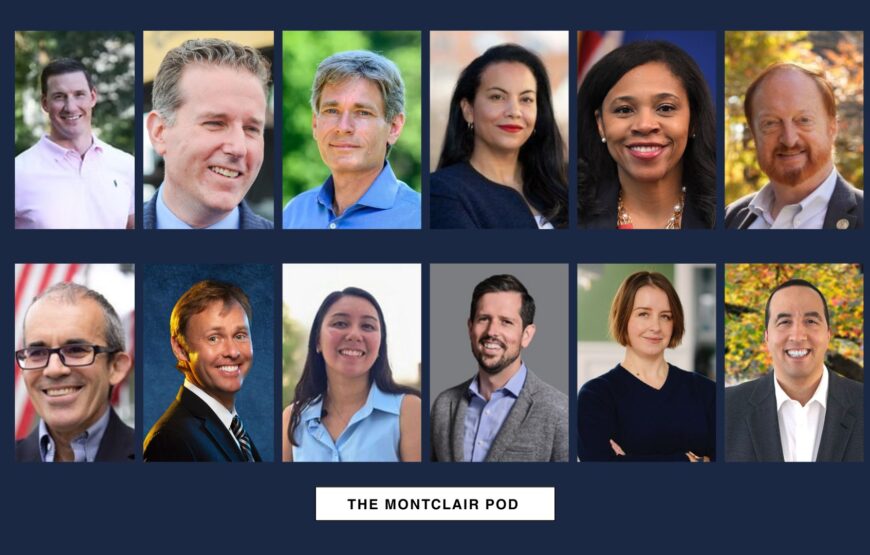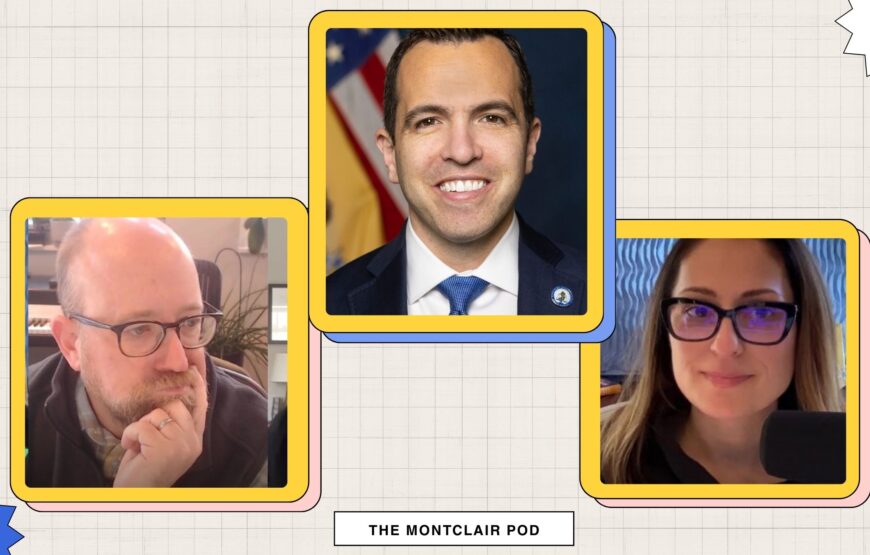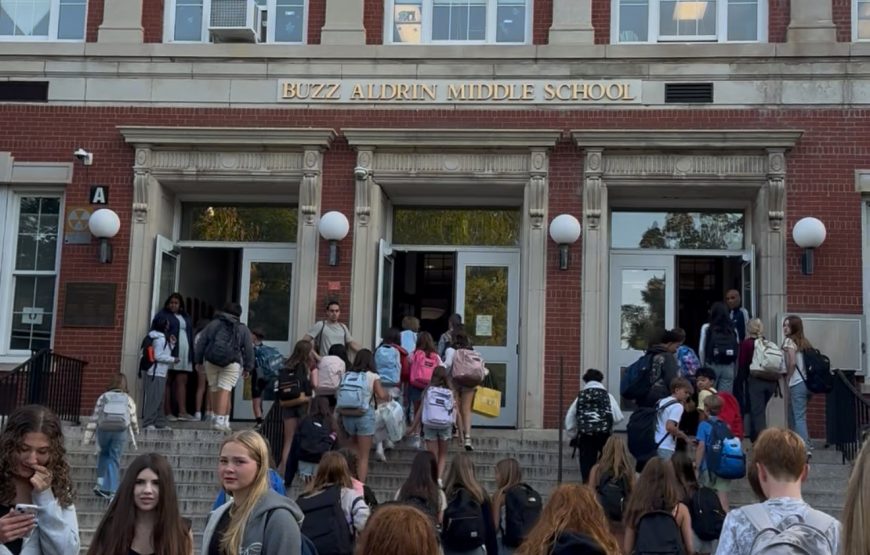Photo Credit: Brendan Gill



In an exclusive conversation with The Montclair Pod, Essex County Commissioner Brendan Gill, a proud Montclair High School alum, shares his perspective on the town’s budget crisis, lessons from neighboring districts, and how state politics may shape Montclair’s future. Gill reflects on Montclair’s legacy of integration and educational equity, weighs in on the December 9 referendum questions, and makes the case for accountability and transparency in district finances.
The Montclair Pod:
You went through the Montclair Public Schools and graduated from Montclair High School. How did that experience shape your perspective?
Brendan Gill:
I went through the Montclair Public Schools and graduated from Montclair High School in the early nineties.
But even then the Montclair experience I think was different than a lot of the other surrounding communities. It was a place that was not only racially diverse, but socially economically diverse. The experience was just different than some of the surrounding communities.
And I don’t say that to be critical of any of the surrounding communities. [Montclair] just had a composition that gave you a social education that was different than other places that tended to be more monolithic. New Jersey is one of the most segregated states in the country, and Montclair itself dealt with those same types of issues, but dealt with them, particularly at an earlier time, through the prism of its schools.
My own family’s history and stories around that too. My dad was a public school teacher here for 53 years, and he talks about when he first got here in the early seventies about his experience of being assigned to Glenfield Middle School and how the books and the materials that he was given as a young teacher on that very first day were from the north end of town. They were from Mount Hebron, meaning that the school that was in the predominantly African American and more socially disadvantaged portion of the community was receiving books and materials and things that were 15, 20 years older than what the kids who went to Mount Hebron received.
And he was part of a group of young teachers at that time who collaborated and worked on the original version of the magnet schools that you see exist to this day. It’s the reason that we don’t have neighborhood schools in Montclair. That led to a lot of the integration that Montclair is so known for now.
And I’m a product of that. I’m a product of that experience, of hearing those stories and witnessing how people can effect change on the local level. And that led to my own journey into public service.
the Montclair Pod:
You have this really important lens. We’re not the only district that has financial challenges, as you’ve pointed out. Nutley next door is going through their own state monitor situation. Have you seen other districts go through these challenges, and what can you share with us about lessons learned or even cautionary tales?
Brendan Gill:
In Nutley, they chose to take the loan, and with the loan from the state comes the state monitor.
And with the state monitor comes the fundamental question around loss of local control, right? So in that situation, Nutley chose to go that route in order to protect their immediate need. They were willing to work through that system and felt that they could protect other educational priorities, the integrity of the district.
And for the most part, what I’ve heard, again, this is not a scientific sample, but for some of the elected people that I’ve spoken to and other members of the community, they’re happy to see that oversight to put the district back on track. [They] have not necessarily, at least as far as I know, run into any major issues around curriculum, staffing and other things like that where they don’t feel that the community need is being heard or met.
In East Orange, they went the opposite direction. They went to fix the short term, but to maintain their control and try to, because they thought that was important. They had a massive amount of cuts. And this is all publicly reported. It was up to, I think, 95 teachers, mid-year, cut from their district. This is a larger district, a 60,000-person municipality, but in that situation, folks were not happy about losing that many teachers, slowly staffing back up over time, and they decided they wanted to control their own destiny.
And there’s obviously a lot of detail around both question one and question two, but that’s to me the bottom line community question, right?
And I want to preface this all to say that I like everyone else, I’m trying to understand.
the Montclair Pod:
You’re learning in real time, like us.
Brendan Gill:
Yeah. Yeah.
She’ll probably hate that I put it out there, but my daughter goes to Buzz Aldrin. She likes the clubs, right? That whole story that was covered in one day was like, hey, we’re not going to be able to fund these clubs anymore as part of this larger deficit. Then there was a separate story that said even the clubs weren’t properly approved.
We’re receiving as parents notices from the school saying, “Hey, we’re going to probably have to cut X, Y, and Z,” and we’re trying to sort it all out with the baseline, which I think most people in the community would agree. The majority, I would suspect, say, “We’d like these clubs to be available.” Who’s against after-school enrichment? And if you are, that’s a whole different conversation.
But who’s against these types of things that we want to be able to support, of course, in our schools?
And then to be able to sort out how that’s directly related to what’s going on right now? It’s not going to solve a $20 million deficit.
So then there’s the scale here too. I appreciate that everything should be on the table. How do we make sure that balance happens at the same time as well?
the Montclair Pod:
Let’s shift gears a little bit and talk about how Trenton politics may or may not impact municipalities like ours. If we do end up having to take out a state loan, and that comes with a fiscal monitor, and we have Republican control of at least the governorship, there’s a concern that the administration would make a mockery out of Montclair. How fair is that connection?
Brendan Gill:
I think what’s most important is what Jack Ciatterelli really said during the debate, and what he said very clearly was that he does not believe in the type of integration model that exists in Montclair.
And one of the things that you could run the risk of if you have a state monitor that’s appointed by a governor Ciatterelli, is that the person comes in and does not share the educational philosophy or value around that. So one of the big factors in the budget is the transportation cost. That’s going to jump. That’s been publicly reported.
I’m concerned less about this idea of Montclair being punished because it’s a predominantly democratic community. It supports democratic candidates. However, it is a real concern about, again, what he said publicly during that debate when this issue was raised, about what his educational philosophy is.
And it said to me that this is a person who doesn’t really understand, in my opinion, why we’re even here. Why we are where we are in Montclair, not perfect by any stretch. And still trying to hold on to some of that.
And he could definitely appoint a person who doesn’t believe that at all. And once that happens, you really do lose your recourse, right?
If Congresswoman Mike Sherrill becomes the governor, which I do think she will be our next governor. You hope that there’s a deeper understanding of those issues, of what’s important and that’s factored into the person that if, let’s say we do end up having to do a state monitor, that is factored into that decision making process, of what what the community wants.
the Montclair Pod:
Would you be comfortable sharing how you’re thinking about your own vote on December 9, or at least the factors that you’re weighing as a parent and a taxpayer?
Brendan Gill:
No problem at all. I’m “yes” on the second question for sure. I don’t want to see this year disturbed in the way that it’s being talked about. For me personally, it’s important that we keep that continuity for the kids this year.
I’m leaning towards yes on number one. But, evaluating that in the context of how we got here, too, right? So that’s where I do think a little bit about the solution going forward. There are still some unanswered questions in my mind around how we got here that I’m not saying would sway me to a “no,” but I’m still going to continue to try to seek out those answers just as a community member before making that final decision.
the Montclair Pod:
There’s also a contingent of folks in town who feel the schools need a reset.
Brendan Gill:
I understand that. Part of the thing is you don’t want to be in a position where you’re defending an antiquated status quo either, right?
That to me is important. I talk about this a lot in the context of partisan politics and in a volunteer capacity. I’m also the chair of our local Democratic Party here in Montclair. And one of the things that I think about a lot, too, is that there are things that may have elements of truth, so to speak, to them.
I’ll use the Elon Musk and Doge situation. We know that there are some issues with federal bureaucracies. We know that government bureaucracies need to be looked at, right? But we don’t want to be defending something that we know needs some reform, but we also don’t want that either.
We need to have some real tough conversations. What should public education look like? How should that work? I could talk to you all day about challenges that I’ve had with my own kids within the schools.
I also know that I don’t want to make policy, right? Based on my own personal experience.
the Montclair Pod:
Do you feel like the Board of Ed is able to actively manage the administration the way they’re supposed to?
Brendan Gill:
I don’t know.
I’ve been a proponent, I’ve said it publicly. I think we need a forensic audit. This is one area where I do disagree with the decisions that are being made right now. I think we need a forensic audit, like, yesterday.
I’m glad to see it included in the question, but I don’t know how to answer it.
I know as an elected official that you rely on professional staff like a county commissioner. We, a nine-member legislative body, oversee a budget of close to $780 million. We have professional staff that we work with, just like Board of Ed members do. And at some point, you have to rely on the assurances that you’re given and the information that you are presented when you’re in those roles.
One of the open questions, quite frankly for me, is that we have a situation where the prior business administrator was awarded a bonus as a part of her contract for reaching certain metrics in the fiscal health of the district or presenting certain metrics.
So just a very logical question that I have is what was in those documents that she prepared that allowed that bonus to be awarded?
You either had a situation where someone, for whatever reason, either was gross negligence, or they knowingly and willingly presented false information.
That’s my opinion. So that’s an open question as far as I’m concerned, as a community member, that I don’t feel it has really been answered.
the Montclair Pod:
We absolutely need a forensic audit to figure out what happened, but isn’t there a role for a state or a county investigator to look into this? There are laws related to fraud. Why isn’t this being investigated by some sort of governing body, whether it’s law enforcement or something else?
Brendan Gill:
I don’t know. In terms of oversight, there’s limited review by a county or state office of these local decisions. Based on what’s going on right now, I couldn’t speak to what’s being looked at or not at the county or state level on the criminal justice side.




